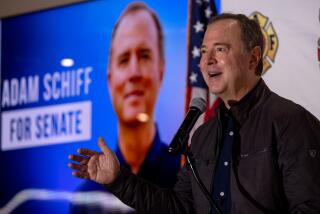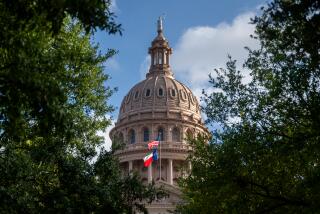Gracious in Defeat, Bush Ponders New Private Role : Transition: The President prepares for his departure from office and searches for meaning in his election loss.
On a bitter January day in 1969, a rejected President Lyndon B. Johnson stood on the Tarmac at Andrew’s Air Force Base, preparing for his last official departure from Washington.
A group of loyal Cabinet members and political allies had passed up the inauguration of Richard M. Nixon to bid L.B.J. farewell as he headed home to Texas. With them was a young, second-term congressman from Houston, the lone Republican among the once-powerful Democrats.
It was George Bush.
“I shook his hand and wished him a safe journey,” Bush wrote sometime later, recalling the poignancy of the moment. “He nodded, took a few steps toward the ramp, then turned, looked back at me and said, ‘Thanks for coming.’ ”
Twenty-four years later, Bush’s own political fortunes suffered much the same numbing reversal that humbled his fellow Texan. Johnson, who in the 1964 presidential campaign had scored one of the greatest landslides in U.S. history, was forced to give up hopes of a second term because of the national turmoil over the Vietnam War.
Bush, ironically, scaled the heights of popularity thanks to American military success in the Persian Gulf War. But disgruntled voters drove him from office for his perceived mishandling of the economy.
Now, the 41st President of the United States prepares for his own transition to private life, watching each day as all but the most formal authority of his office fades.
To be sure, he has suffered defeats before--in a U.S. Senate campaign in Texas in 1964 and again in 1970, and in the GOP presidential primary campaign of 1980. But none carried the same sense of finality that came with his loss to Arkansas Gov. Bill Clinton 10 days ago.
As his own departure on Jan. 20, 1993, draws near, the defeated President searches for meaning in his loss and direction for his future. At this Florida resort, where sunny mornings give way each day to overcast afternoons, threatening clouds and stormy evenings, it is his time, says a close friend, to focus on one thing:
“He’s going to have to find a purpose, what his role is.”
From the beginning there has been, in public, a grace in loss--a characteristic that Bush was taught from the earliest days of childhood as being as important as grace in victory.
But the world he contemplates from the shores of the Gulf of Mexico, on fishing skiffs in the wind-driven swell or behind the whitewashed walls of the Spanish-style estate where he is staying, is a new one for the 68-year-old politician.
“He’s in the realm of the unexpected. He’s adjusting to it, but he’s wondering why, because (his defeat) wasn’t inevitable,” the longtime friend and adviser said. “Right now, he’s in a kind of discombobulated mood.”
“He has been up and he has been down. He is fairly resilient. He is basically an optimist,” the friend said, adding that he is confident Bush ultimately will not take the loss “in a bitter way.”
Still, he said, “From what I see, he is not in a good George Bush mood . . . . I think he thinks this thing was winnable. Let the wounds heal, and around Christmastime, he can be more upbeat about it.”
The once highly visible President has shown very little of himself to the public in the week-and-a-half since Election Day.
He raced through the words prepared for him by his staff when he conceded defeat that night, as though determined through grit to survive the moment without a public display of emotion.
In a two-minute taped radio address a few days later, he accepted full blame for his defeat. And one week after the election, he made his first official trip from the White House to attend a dinner given in his honor by Senate Minority Leader Bob Dole of Kansas, his rival four years ago for the Republican presidential nomination.
It was by all accounts an emotional evening and one that Bush had not been certain he was ready to undertake.
“I didn’t want to come here, but I’m sure glad I did,” he said that night. “Don’t worry about the Bushes. We’re looking ahead now.”
His wife, Barbara, already has begun to make the transition, the President said.
“She’s getting ready to shift gears, and my advice to those of you who are friends (is) give her wide berth, which is what I’m trying to do around the White House there, because she’s a bundle of energy, shifting gears from the present into the future. And that’s the way it ought to be.”
For his part, the President said haltingly, he would “head off for a little vacation and get a little--a little rest and think about what has been and then what--what’s about to be.”
Shortly after his return to the White House that evening, he abruptly notified staff members at 11:30 p.m. that he would be departing momentarily. Within 30 minutes--minus reporters, camera crews and the long retinue that once trailed him in automobiles on his travels about town--he drew up in the still of midnight at the Vietnam Veterans Memorial.
There, he joined briefly in the reading of the names of Vietnam War dead--a ritual that was part of the ceremonies commemorating the 10th anniversary of the wall. After quietly reading aloud 20 of the 58,183 names on the black granite slab, he returned to the executive mansion.
Later that Wednesday morning, he hurried off to Florida, arriving early enough to get in a full afternoon of fishing.
During a vacation one recent summer in Kennebunkport, Me., his string of bad luck trying to snare a bluefish became a front-page gag, a metaphor perhaps for the bigger troubles that could and did befall this President.
Now, he can catch one fish or a dozen. It matters not at all. As his presidency winds down, he and his wife are but tourists, relegated in a front-page headline of the local Sun Herald to a gently derisive, if slightly elevated, status: “The First Snowbirds.”
More to Read
Get the L.A. Times Politics newsletter
Deeply reported insights into legislation, politics and policy from Sacramento, Washington and beyond. In your inbox three times per week.
You may occasionally receive promotional content from the Los Angeles Times.






